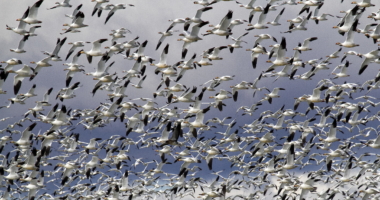ACTION ALERT: The Migratory Bird Treaty Act is still under attack – Comment by December 28, 2020!

The Migratory Bird Treaty Act (MBTA) is one law that has withstood the test of time and helped support a magnificent diversity of avian wildlife across the United States for over a century. Somehow during this national time of upheaval, when our focus should be on community unity and human health, the current administration has found time to move forward with a plan to permanently enact its 2017 proposal to redefine incidental take. Despite your calls to action and a court ruling in August against the current administration’s interpretation of incidental take, the U.S Fish & Wildlife Service just released their Final Environmental Impact Statement (EIS) that is set to codify these changes.
To recall, the Solicitor General’s 2017 interpretation of the law, whose language remains unchanged, reversed the intent of the MBTA to cover “incidental” take, or actions, threats or activities creating indirect sources of bird mortality (think wind farms, coal-ash ponds, utility lines, etc.). In the U.S Fish and Wildlife Services own words, “the Service published a proposed rule clarifying that the scope of the MBTA only extends to conduct intentionally injuring birds. The rule codifies the 2017 Department of the Interior Solicitor’s Office Opinion M-37050, which was a legal determination that restricted the scope of the MBTA to intentional take of migratory birds and concluded that the take of birds resulting from an activity is not prohibited when the underlying purpose of that activity is not to take birds.”
This cannot stand. The MBTA is the primary legal protection birds have from incidental take, and we KNOW that this legal opinion is contrary to the long-standing, bipartisan interpretation of the Act by every Presidential Administration since at least the 1970s.
While the Department moves forward with these changes, states and conservation organizations have been given the go-ahead to bring a court case forward to challenge the proposed changes. But we cannot rely on the courts to revise this commitment to conservation.
THIS IS OUR FINAL CHANCE TO ACT!
The message is simple – Don’t allow the reinterpretation of incidental take under the MBTA – it is one of the laws strongest provisions!
Act quickly, as the review period on the final EIS ends on December 28th, 2020!
Reach out to The U.S Fish and Wildlife Service
U.S. mail or hand-delivery only: Public Comments Processing, Attn: FWS-HQ-MB-2018-0090; U.S. Fish and Wildlife Service; MS: JAO/1N; 5275 Leesburg Pike; Falls Church, VA 22041–3803
AND
We know in Montana our voice at the Federal level only goes so far. Make your impact go further by encouraging your friends and family to reach out to their leadership. Our country’s decision-makers need to hear from all of us.
Additional information and sample talking points:
- The Final Environmental Impact Statement and all related documents are available at https://www.fws.gov/regulations/mbta/process, EIS Number: EIS No. 20200240
- The MBTA was one of the first U.S. environmental laws that set us apart when it comes to conserving wildlife and resources.
- The MBTA is supported by four bilateral treaties with countries that share our migratory bird populations (Russia, Japan, Canada, and Mexico.)
- Codifying an unsupported change in the term incidental take, under the draft EIS will allow industry and irresponsible companies to act in a way that will routinely kill migratory birds large and small, as long as that was not their initial intent.
- The draft EIS does not contain enough enforcement provisions in the new to manage a take permit program.
- The draft EIS does not address enforcement or penalty for negligence and harm to migratory birds.
- After a century of use, the courts, industry, and supporters have found a balanced way to enact its side-boards, while supporting general industrial economic growth.
- Urge this administration to continue the tradition of working to find a balance between industries like commercial utilities, communications, transportation, commercial fishing, national defense, and others to keep our migratory bird populations healthy for current and future generations.
- Conserving birds is a commitment we have to current and future generations as well as our treaty partners.
Some examples of incidental take here in Montana;
Berkeley Pit: No protection for birds that land (and die) in the Berkeley Pit. The latest significant incident was when about 3,000 Snow Geese (and Ross’s Geese) died there in November 2016.
Pipeline Spills: there have been 2 pipeline spills with birds oiled on the Yellowstone River within the last 10 years (July 1, 2011, Silvertip Pipeline Spill, ExxonMobil pipeline, 1,500 barrels of oil, company paid $12 million in damages; January 17, 2015: Bridger Pipeline Company spilled crude oil into the Yellowstone River near Glendive, 42,000 gallons of oil spilled).
For more information contact Amy Seaman; [email protected]
EIS No. 20200240, Final, USFWS, REG, This document is scheduled to be published in the Federal Register on 11/27/2020 and available online at federalregister.gov/d/2020-26179, and on govinfo.gov Regulations Governing Take of Migratory Birds, Review Period Ends: 12/28/2020, Contact: Lesley Kordella 703-963-1729.